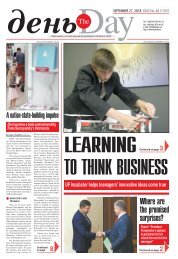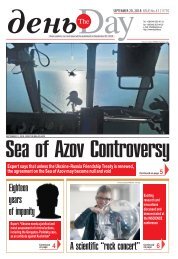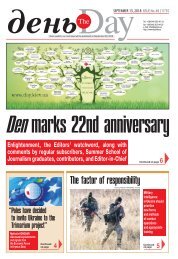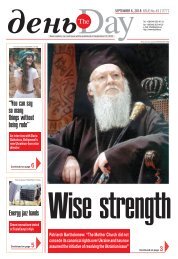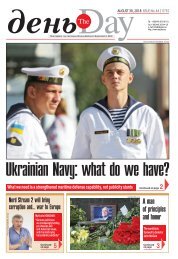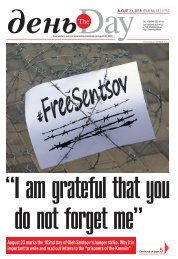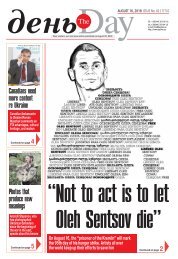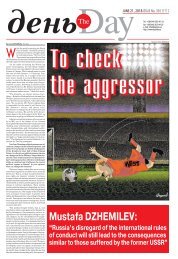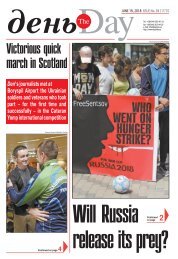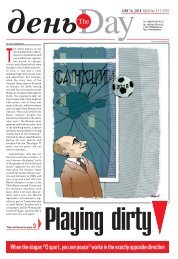36_ENG
Create successful ePaper yourself
Turn your PDF publications into a flip-book with our unique Google optimized e-Paper software.
2<br />
No.<strong>36</strong> JUNE 12, 2018<br />
DAY AFTER DAY<br />
WWW.DAY.KIEV.UA<br />
By Volodymyr KOSTYRIN<br />
Photos by Mykola TYMCHENKO, The Day<br />
This is only the first part of the<br />
project, which has already<br />
found a broad response among<br />
viewers, particularly on<br />
YouTube. Although the subject<br />
the author broaches is rather<br />
complicated, the audience reacted<br />
approvingly. The film’s author<br />
himself, who was born and raised in<br />
Luhansk, stayed behind in his native<br />
city until September 2, 2014, and<br />
saw the dramatic events of Russian<br />
aggression against Ukraine. Later<br />
on, Valentyn Torba wrote a book, I, an<br />
Eyewitness. Notes from the Occupied<br />
Luhansk, on the basis of his reminiscences<br />
and diary. The film is sort of<br />
the author’s video reproduction of<br />
his reflections on those events.<br />
“My book, published by the newspaper<br />
Den, must only be viewed in the<br />
reference frame of two other books in<br />
the ‘Contemporary History for Dummies’<br />
series,” Den’s journalist Valentyn<br />
TORBA says. “A prolog of<br />
sorts to it is Ivan Kapsamun’s book<br />
‘The Trap,’ or A Case without a Statute<br />
The harsh reality of war<br />
Last week Den’s journalist Valentyn Torba<br />
presented his film Luhansk:<br />
Occupation at the Kyiv House of Cinema<br />
Indeed, it is impossible to find<br />
the causes and effects of the current<br />
war without sinking into history –<br />
both the domestic history and the<br />
history of our country’s relationships<br />
with the neighbor that eventually became<br />
the enemy.<br />
“The main conclusion for me is<br />
that this film has a cause-and-effect<br />
relation,” says Ivan KAPSAMUN,<br />
controlled the city. Let me tell you<br />
how he began cooperating with Den.<br />
As early as during the so-called ‘Russian<br />
spring’ in the spring and summer<br />
of 2014, Valentyn’s biting and meaningful<br />
posts and blogs in Facebook,<br />
where he described what was going on<br />
in his city and region, drew the attention<br />
of Den’s editor-in-chief Larysa<br />
IVSHYNA who invited him to contribute<br />
to our newspaper. He agreed,<br />
sk: Occupation is a very serious work.<br />
Valentyn in fact adapted to the screen<br />
what Den had been writing about for<br />
many years. I wish my colleague success<br />
and want as many people as possible<br />
to watch it because, before occupying<br />
our territories, the Kremlin<br />
‘occupied’ people’s brains. To ward<br />
this off, one must know contemporary<br />
history on the basis of the Den’s Library<br />
and the presented film.”<br />
300 years ago and even earlier. The<br />
war is permanent, and it did not begin<br />
in 2014. We were being exterminated<br />
and manipulated in 1933 and well before<br />
that. And, instead of forming<br />
state institutions, the authorities<br />
palmed off certain individuals upon<br />
us, who were just ruining these institutions,<br />
ruining the groundwork<br />
for the restoration of our statehood.<br />
And why are governmental officials<br />
indifferent? Let me say an objectionable<br />
thing: I am convinced for some<br />
reason that the political elite seems to<br />
be feeling good even without Luhansk,<br />
Donetsk, and Crimea.”<br />
“It was about the Ukraine-Russia<br />
border,” civic activist, journalist,<br />
and political scientist Oleksii PODOL-<br />
SKY said after watching the film.<br />
“The first negotiations on this matter,<br />
in which I took part, began in 1995.<br />
Before that, we and Russia had never<br />
negotiated the border question. I was<br />
a diplomat at the time and first came<br />
to Luhansk, when we were trying to<br />
persuade the leadership to follow the<br />
Estonian way. I took part in the<br />
closed-door negotiations about the<br />
Black Sea Fleet, as well as in the talks<br />
about gas with participation of<br />
AT THE SCREENING OF THE FILM LUHANSK: OCCUPATION, THE FUTURE OFFICERS WERE DEEPLY MOVED NOT ONLY BY THE FOOTAGE AND CONTACTS WITH GUESTS, BUT ALSO BY BEING GIVEN THE<br />
BOOK “THE TRAP,” OR A CASE WITHOUT A STATUTE OF LIMITATIONS, A TEXTBOOK ON UKRAINE’S TRUE CONTEMPORARY HISTORY<br />
of Limitations which tells the prehistory<br />
of the political ‘trap’ into<br />
which this country fell. My film is sort<br />
of a video illustration to the trilogy<br />
Den published as far back as 2015.”<br />
Torba said after the screening:<br />
“I’ve brought some books and would<br />
like to gift them to the military present<br />
here. Here is the book ‘The Trap,’<br />
or A Case without a Statute of Limitations<br />
by Ivan Kapsamun, editor of<br />
Den’s politics section. Note the phrase<br />
‘without a statute of limitations.’<br />
Our current problem is that we think<br />
in the terms that call us for artificial<br />
reconciliation. We think: well, OK,<br />
let’s forgive, forget, make friends,<br />
hug, and things will be all right. Do<br />
you remember, by the way, the fake<br />
photograph in the internet about how<br />
the Ukrainian-Russian border must<br />
look like? It shows people drinking,<br />
eating, etc., at the table. The killing<br />
of us begins with this illusory reconciliation.<br />
Nobody wants to ‘fraternize’<br />
with us. They want to exterminate<br />
us, Ukrainians, wipe off our<br />
memory, and turn us into an eternal<br />
second-rate satellite. The aggressor is<br />
taking advantage of our weaknesses to<br />
this end. Therefore, we must not forget<br />
both the foreign and the domestic<br />
enemy.”<br />
editor of Den’s politics section. “This<br />
is the most important point. For what<br />
we have in the information space today<br />
is just a picture, sometimes a<br />
conclusion, with no explanation of<br />
what caused one problem or another.<br />
And many fall for this. This film<br />
practically shows the contemporary<br />
history of Ukraine, including the way<br />
the occupation of the Luhansk region<br />
was prepared and finally carried out.<br />
The film also recalls the Holodomor<br />
period and emphasizes that our country<br />
found itself in a very difficult situation<br />
in the early 1990s because it<br />
had a postcolonial and post-genocidal<br />
society. Such difficult times require<br />
very strong efforts to build the state.<br />
But, we saw in the film that, instead<br />
of building state institutions, the<br />
leadership of this country formed a<br />
clannish oligarchic system, in which<br />
we are in fact still living. The revolutions<br />
we had can hardly be called<br />
revolutions. Society was doing very<br />
much to break this system but, unfortunately,<br />
failed to do so. For society<br />
itself is sick and was unable to organize<br />
– neither after the first nor after<br />
the second Maidan.”<br />
Kapsamun also added: “Valentyn<br />
stayed in Luhansk to the last moment,<br />
when Russian troops in fact<br />
and then, on the chief editor’s instructions,<br />
I came into direct contact,<br />
as I edited many of his texts. We<br />
thus began to receive on-the-spot information<br />
and analyses of events.<br />
Later, when it became dangerous to<br />
stay on in Luhansk, Valentyn had to<br />
leave the native city. He moved to<br />
Kyiv, and the newspaper offered him<br />
a job on the staff.<br />
“In 2015 Den prepared a trilogy of<br />
books compiled by me (‘The Trap’),<br />
Torba (I, an Eyewitness), and Maria<br />
Semenchenko (Catastrophe and Triumph).<br />
The first is about why this<br />
country got into a ‘political trap’ on<br />
the example of high-profile murders of<br />
Yevhen Shcherban, Borys Derevianko,<br />
Vadym Hetman, and, as the apotheosis<br />
of the system, the attempt on the<br />
life of Oleksandr Yeliashkevych, the<br />
attack on and kidnapping of Oleksii<br />
Podolsky, and murder of Georgy<br />
Gongadze. Consequentially, the second<br />
book is about the living and dead heroes<br />
who went to war in the east and<br />
covered with their bodies the mistakes<br />
politicians had made.<br />
“To launch Den’s books, we in<br />
fact traveled all over Ukraine, doing<br />
the educational work the state is normally<br />
supposed to do. The film Luhan-<br />
“This is really a story that touches<br />
one on the raw, and I would like the<br />
people who have nothing to do personally<br />
with our Luhansk region to<br />
watch the first and the next parts of<br />
the film,” civic activist Maryna ZOLK-<br />
INA said during the film presentation.<br />
“I am often asked, because of my<br />
work, why certain decisions are not<br />
made. All I can do is give a not-soprofessional<br />
explanation of why we<br />
show this kind of reaction to this procrastination.<br />
In my view, this happens<br />
because those who must, by force of<br />
our choice, make decisions are indifferent.<br />
You, Valentyn, are not indifferent.<br />
You, as a journalist, a writer,<br />
and a person who makes no decisions,<br />
are not indifferent. So where should<br />
the central authorities draw strength<br />
to regain the temporarily occupied territories?<br />
Where is the source of the<br />
strength that will help us achieve<br />
this?”<br />
“In my opinion, our first source of<br />
strength is to be able to understand<br />
that the war will never end,” Torba answered<br />
this question. “Terrible words<br />
indeed, but we are now in the state of<br />
a permanent war. And if we try to persuade<br />
ourselves that things will be different,<br />
we will be wrong. Things won’t<br />
be different. They were not different<br />
Lazarenko and Turkmenistan. I finally<br />
saw that our leadership was the<br />
No. 1 traitor, that the agent of Russia,<br />
who was selling our state out, was<br />
the head of our state. So I, chief of the<br />
Russia department of our Foreign<br />
Ministry, deliberately joined the opposition<br />
to Kuchma. I was busy writing,<br />
running around, keeping a secret<br />
print shop, and so on. All this resulted<br />
in the Gongadze case. You should<br />
know that Gongadze and other likeminded<br />
people also participated in<br />
this. Do you remember<br />
Yeliashkevych? And Yurii Orobets?<br />
Many of them have already passed<br />
away. I am a person who took part in<br />
all of this and saw everything with my<br />
own eyes. Do you remember the Black<br />
Sea Fleet negotiations, when Crimea<br />
was being surrendered for a gas bribe?<br />
Such entities as RosUkrEnergo were<br />
a feeding trough for the families of<br />
our presidents. Torba was right to say<br />
that the war will go on. The film is<br />
about this, about how cynically<br />
Crimea and the Donbas were surrendered.”<br />
The author also plans to show the<br />
film in Sievierodonetsk, Luhansk<br />
oblast, which was lucky enough to be<br />
liberated as far back as the summer<br />
of 2014.



